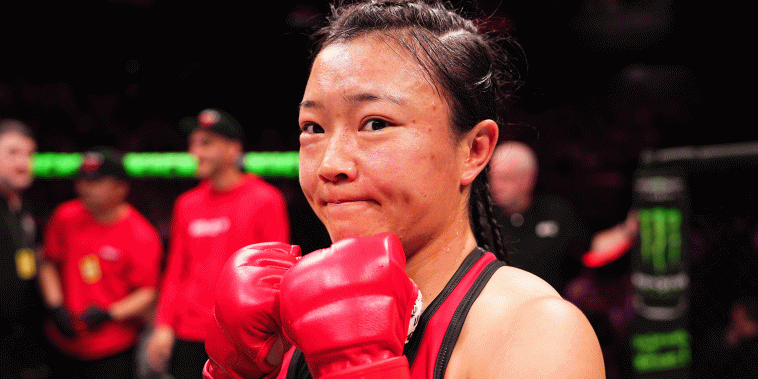YUNNAN, Southwest China — Shi Ming has a three-body problem. Doctor, fighter, daughter — three identities trapped in a fragile orbit.
One pulls her through quiet hospital wards, where Dr. Shi takes a pulse, writes prescriptions, or gently sets an acupuncture needle. The other drags her into an unforgiving MMA octagon, where, fists clenched and stance low, “The Doctor” fights under a different oath.
And in the space between, she hides one world from the other. Her colleagues don’t ask, her parents would never approve, and the ring doesn’t care.
But for one fleeting moment on Nov. 23 in Macau, everything aligned. With defeat looming and the clock ticking down, Shi Ming unleashed a lightning head kick — so devastating and unexpected it froze the arena. The strike sent her countrywoman and strawweight title contender Feng Xiaocan, 22, crashing to the canvas.
Seconds later, the crowd erupted. Zhang Weili, China’s first UFC world champion, leaped from her commentary seat, exclaiming, “Amazing! It gave me chills.” Feng had to be carried out on a stretcher and taken to hospital, though doctors confirmed no major injuries.
Within hours, that whiplash kick looped endlessly across Chinese social media, racking up millions of views. The surreal contrast — Shi in a white coat in one frame, red fight gear in the next — only fueled the frenzy. “Imagine waking up in the hospital after being knocked out, only to find Shi Ming adjusting your IV drip,” joked one viral comment.
The irony wasn’t lost on her. “I didn’t expect her injury to be so severe. I felt deeply guilty,” she recalls.
“This is my biggest problem. I want to finish the match, but I don’t want to hurt my opponent,” Shi tells Sixth Tone. “Right now, I can’t find a balance between the two.”
And keeping the two apart was now impossible. Word of her victory spread through the hospital halls. Colleagues whispered, patients openly stared, and even the hospital director was seen casually chatting with her MMA coach.
“Suddenly, everyone was talking about MMA,” Shi recalls. “It felt strange and surreal, like a clash of two different worlds I had kept so separate.”
In recent weeks, media appearances, interviews, and sponsorship obligations have pulled her away from her medical duties as a licensed doctor in both Western and traditional Chinese medicine at a downtown hospital in Kunming. Fans have even started showing up at her workplace, disrupting the quiet hospital routine.
If forced to choose, she admits she’d gradually shift her focus to MMA. “My family would probably prefer that I stay in medicine,” she says. “But this opportunity is so precious.”
Winning the Road to UFC strawweight championship in Macau meant more than a belt. Shi walked away with a UFC contract, a $50,000 “Performance of the Night” bonus, and became one of just 16 Chinese fighters in a league of over 900 competitors.
Her success marks another step in MMA’s rise in China — a sport that climbed from obscurity after Zhang Tiequan became the first Chinese fighter to sign with the UFC in 2011. Zhang Weili’s championship win in 2019 made MMA a national sensation.
Today, events sell out in hours, drawing thousands of spectators. On Douyin, China’s version of TikTok, the UFC’s official account commands over 10 million followers. After her win, Shi’s own Douyin following surged by 50,000 in a single day.
Yet for Shi, the path to the cage began in quieter corners — conventional family expectations, long hours in lecture halls, and late nights in the gym with a mentor who changed everything.
Growing up in Kunming, the provincial capital of Yunnan in southwestern China, Shi bounced between basketball, football, and running. But it was martial arts that truly captured her imagination. She earned a black belt in Taekwondo, practiced sanda, a mixed martial arts form developed by the Chinese military, and later added Muay Thai and boxing to her repertoire.
“As a child, I was full of energy, lively, and had a personality more like a boy’s. I even kept my hair short back then,” she says. Though fighting had taken root, it was still just a sideline.
Instead, Shi’s late grandfather, Yang Yihua, a traditional Chinese medicine (TCM) doctor who served in the military, nudged her down a different path. He shared harrowing stories from those years — of makeshift clinics, sleepless nights, and life-or-death moments in times of conflict.
After the war, he opened a small clinic. Shi spent her childhood there, mixing herbal remedies and dressing bloody wounds — unfazed by the mess, steady under pressure.
Her calm hands and focus seemed tailor-made for medicine, which promised a stable career and a respected life. In 2015, after high school, she enrolled in medical school in Kunming.
That first year wasn’t what she expected. “It felt like I was right back in high school again,” she says, recalling grueling days that stretched from 8 a.m. to 7 p.m., followed by endless exam prep.
Fighting offered a brief escape. She squeezed in training sessions whenever she could. By the end of the year, she was invited to compete in an MMA competition, then still a niche sport in China. Curious, she accepted.
“I thought it was brutal, almost savage,” she recalls. “Unlike boxing or kickboxing, where the gloves are bigger, MMA fighters are locked in a cage, trading blow after blow for 15 minutes. They’d leave the ring bruised and bloodied.”
Yet, that cage kept calling. By 2017, Shi’s MMA journey had stalled: a debut win followed by two consecutive losses. Standing just 158 cm tall with a reach of 152 cm, she was often the smallest fighter in the cage, outmatched in height and reach. Brute force wasn’t enough to close the gap.
In search of answers, Shi signed up for what she thought was another sanda course in Kunming. Instead, she’d walked into an MMA masterclass.
On the mats, an Iranian wrestler moved with quiet precision, dismantling opponents in minutes using intricate joint locks — never taking a single punch. It dawned on Shi: strategy mattered more than strength. “It completely changed my understanding of MMA,” she says.
In Kunming, the Iranian goes by Coach Bagher — a wrestler with over 30 years of fighting experience, widely regarded as China’s only catch wrestling coach, and known for turning underdogs into tacticians.
“The biggest difference between our gym and others in China is our focus on technique and strategy,” Bagher explains. “You don’t need to be a strong or powerful man. Even a skinny guy or girl can win. It’s a chess match. We’re not trying to win by force. We’re trying to win by strategy.”
Catch wrestling, with its emphasis on leverage and control, gave Shi a way to counter larger opponents. “There are maybe 10 basic standing techniques,” says Shi. “But wrestling has thousands. Every move has five or six precise steps, each one critical to gaining the right position and winning.”
And win she did. Under Bagher’s eye, Shi went from a single win in three attempts to dominating 16 out of her next 19 fights.
By 2021, Shi had passed the UFC joint trials, a program designed to scout and train potential fighters. For the first time, she saw the systematic machinery of professional MMA — the discipline, the scale, the talent — and felt her ambition grow.
But the demands of medical school weighed heavily. Her final internship year was the toughest, rotating between hospital departments every two weeks and juggling day and night shifts, with barely any time left for herself.
“But every time I saw the yellow mats in the gym, it lifted my spirits,” she says.
Outside training, Shi cuts a quiet figure — white coat, black-framed glasses, long hair tied low. During hospital rounds, her voice is soft and her smile shy, a dimple on one side flickering with each nod to a patient.
It’s easy to see why fight fans have dubbed her “The Doctor.” But Shi herself prefers “Sister 13.” The name comes from the protagonist in the 1998 Hong Kong martial arts film “Portland Street Blues” — a fearless, sharp-witted fighter who holds her own in a world dominated by men.
It’s a duality that still baffles those who know her. “She is quite sweet and kind in person — you’d never guess she’s so incredible in martial arts,” says Wu Hongxi, a classmate who trained alongside Shi for two years.
Most days, Shi shoulders a black UFC backpack nearly half her size. Inside: a doctor’s coat and fight gear. But by early 2024, one stayed buried at the bottom as training for her UFC debut consumed her time.
“When Shi makes a mistake, she identifies it, predicts where she might go wrong again, and keeps trying. And when I step in to give feedback, she listens and improves,” Bagher says. “This is how you truly learn.”
Bagher still remembers the young woman who first walked into his gym. “She was shy, very quiet. Just like a normal girly girl, with no natural athletic abilities. Her balance was really bad, and she didn’t have a proper sports background,” he recalls.
Yet, she had something just as valuable: years of medical training. It didn’t teach her how to hurt, but how to last — and recover.
Shi could treat lumbar strains, ease ligament pain, and manage the subtle signals her body sent under pressure. When competitions collided with her menstrual cycle, she’d use acupuncture to relieve pain.
“I think being a doctor and being a fighter are quite similar because both require extensive knowledge and years of accumulated experience to truly excel,” says Shi.
After every fight, she hit the notebooks. Using elaborate sketches, she mapped out every round, every move, every mistake in precise colors, annotations filling the margins. It was a habit she’d honed in medical school, memorizing charts and case files with the same focus.
“As a doctor, one misstep could endanger a patient’s health. Similarly, in fighting, a single mistake could mean suffering a sudden, devastating blow.”
No amount of training could stop her from taking hits. Shi felt them all — deep bruises, swollen joints, raw knuckles. Yet the hardest part came after each bout: returning to her other life and pretending it never happened.
Her parents knew nothing — because she made sure they didn’t. They had never seen the scars, never heard the stories. “My parents are quite traditional. To them, there are only two proper jobs: doctor or lawyer. I don’t think they would understand MMA,” she says.
When traveling for a fight, Shi crafted careful excuses — attending a sports event, going on a trip — always accompanied by photos to complete the illusion. If she returned with visible bruises, she’d stay away for days, waiting for the marks to fade before going home.
She still hasn’t told them, not even after her knockout win in Macau made her a social media sensation. Her parents rarely use social media and have no interest in MMA, she reckons, so they’re unlikely to stumble across her fights online.
But secrets have a way of slipping through. “Perhaps they do know, and choose to stay silent,” she says.
Shi knows her parents well enough to understand why. They’re not the kind to stop a daughter from chasing a dream. But fear would follow every match, every strike. “If I told them about my fights, they’d likely lose sleep worrying about me, even though UFC is actually safe. They’d still fear that 1% chance of me being knocked unconscious,” Shi admits.
It’s why the life they wanted for her — the steady life of a doctor — still holds so much weight.
Not long ago, Shi noticed something in a family member: a toothache, shoulder pain, faint discomfort — a pattern she couldn’t ignore. She acted fast, and tests confirmed a partial myocardial infarction. A stent was placed just in time.
“If it hadn’t been discovered, the condition could have been a ticking time bomb,” Shi says. “Without my medical knowledge, I might have lost a loved one.”
But knowing how to save a life meant she could just as easily break one: a burden that followed her through every fight leading to her defining night in Macau.
She held back in her first two bouts, choosing submission holds over aggressive, decisive strikes. It let her opponents recover, dragging the fight longer than it needed to go.
Before the title bout against Feng, friends, support staff, and her coach had just one refrain. “If you want to be a true UFC fighter, you can’t fight like this. Not in the final match… not when the title is on the line.”
So Shi let go.
Even after landing that title-winning high kick, she rained down ground-and-pound blows on the motionless Feng — until the referee dragged her away. As the cameras flashed, Shi’s shy smile faltered, her eyes flicking to the medics now gathered around Feng.
Today, that image still lingers. Shi carries it with her into every training session, but she knows fights won’t always end this way. “In future matches, I’ll be facing high-level opponents from all over the world,” she says. “I’ll probably be the underdog, so I might not have to worry as much about hurting them. Instead, I’ll focus on not getting hurt myself.”
Then what of Dr. Shi, and the stable career her parents dreamed of?
Not gone, she says. “Even if I can’t continue working full-time, I’ll stay involved through research or collaborating with medical institutions. I value my family a lot, and I know being a doctor can help them.”
As an only child with aging parents, Shi feels deeply tied to her roots. “I love coming home. I don’t want to live too far away. Even if there are arguments, it’s still better than being apart,” she admits.
But MMA won’t wait forever either. Every fight carries its risks, and Shi knows her prime won’t last long. “This is my chance to chase the UFC championship belt.”
“Or I can do both and switch to sports medicine,” Shi says — half a thought, half a wish. Then her voice steadies. “Maybe this is just how I feel. I chose medicine to help my family, and MMA for myself.”
Doctor, fighter, daughter — all are still in motion. And time will tell where gravity pulls her next.
Additional reporting: Xie Anran; editor: Apurva.
(Header image: Shi Ming, moments after her victory in Macau, Nov. 23, 2024. Jeff Bottari/Zuffa LLC/VCG)





GIPHY App Key not set. Please check settings